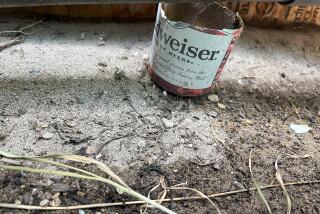House Approves Tougher Federal Pesticide Controls
- Share via
WASHINGTON — The House Friday endorsed a sweeping plan to toughen federal controls on pesticides but voted to strip California and other states of the right to set even stricter standards.
Environmentalists and chemical industry representatives hailed the 329-4 vote for the overall legislation, which would force the government to expedite health and safety testing of hundreds of pesticide products already in use, ranging from bug sprays to farm chemicals.
However, they expressed disappointment that the Democratic-controlled chamber also voted 214 to 121 for an amendment sought by food producers and some farm groups that would prevent states from setting tighter tolerance standards for pesticide residues than those imposed by the Environmental Protection Agency.
Backers of the controversial provision said the nationwide distribution of food products would be disrupted if safety rules differed from state to state. “The basic question is whether or not we can have 50 different interpretations of this law without infringing on and basically destroying the interstate commerce of these products,” Rep. Charles W. Stenholm (D-Tex.) said.
But critics contended that state governments had proved quicker and better at testing pesticide safety than the EPA, and suggested that the food industry wanted the uniform standards rule to keep state officials from pulling products off grocery shelves.
“It’s very callous,” said Laurie Mott, senior project scientist for the National Resources Defense Council. “It’s going to make people wonder more about the safety of their food.”
Legislation similar to the House bill was approved by the Senate Agriculture Committee last month and could be considered by the full Senate as early as next week. The Reagan Administration has opposed the bill because it contends that new charges levied on chemical manufacturers to help pay for accelerated testing of chemicals are insufficient to cover the cost of the new program.
However, if it is enacted, the measure would represent the first major overhaul of federal pesticide law in 14 years. Environmentalists had long sought such changes, but their efforts were blocked until pesticide manufacturers dropped their longstanding opposition to the changes and agreed to a compromise series of reforms earlier this year.
Jack Early, president of the National Agricultural Chemical Assn., said producers had concluded that the reforms would increase public confidence in their industry.
“We’re convinced the products are safe, but we also understand that it’s in our interest to make sure the public understands that as quickly as possible,” said Early, whose organization represents 92 major pesticide manufacturers. “It removes the fear out there over whether these products are safe or not.”
New Safety Tests
The bill would require the EPA to conduct new safety tests on about 600 compounds that are the building blocks for the approximately 50,000 pesticide products already on the market. Congress ordered such testing in 1972 but set no timetable for its completion. So far, only a handful of the chemicals have been fully examined to determine whether they cause cancer, birth defects or other illnesses.
Under the measure, the testing process would have to be finished in nine years. To help pay for the program, chemical companies would be charged $150,000 for each compound tested. The tests would determine not only whether chemicals are safe but the maximum amount of residue of various chemicals on food products that could be safely ingested.
Other provisions set new, rigid controls on pesticide use to protect the nation’s drinking water supply from contamination by farm chemicals and mandate the EPA to upgrade rules to protect farm workers from pesticide contamination and expedite procedures for taking chemicals found to be dangerous off the market.
Food Import Restrictions
The House bill, unlike the Senate version, also for the first time would impose restrictions on the importation of foods tainted by chemicals outlawed or restricted in this country. Current law allows several such foreign products to be sold in this country.
Farmers say the rules put them at a competitive disadvantage with foreign growers, while environmentalists argue that it is wrong to sell products considered unsafe simply because they are grown elsewhere.
But the Administration opposes a ban on the foreign goods, arguing that it could trigger a trade war.
Mott said the coalition of environmentalists and manufacturers would mount a major campaign in the Senate to knock down the uniform residue standards rule added in the House. Despite the controversy, only twice have states set tougher safety rules than the federal government.
In one of those instances, California and several other states two years ago lowered below EPA standards the levels of ethylene dibromide, a grain fumigant, that could be allowed in baby food. EDB is a known carcinogen.
More to Read
Get the L.A. Times Politics newsletter
Deeply reported insights into legislation, politics and policy from Sacramento, Washington and beyond. In your inbox twice per week.
You may occasionally receive promotional content from the Los Angeles Times.










